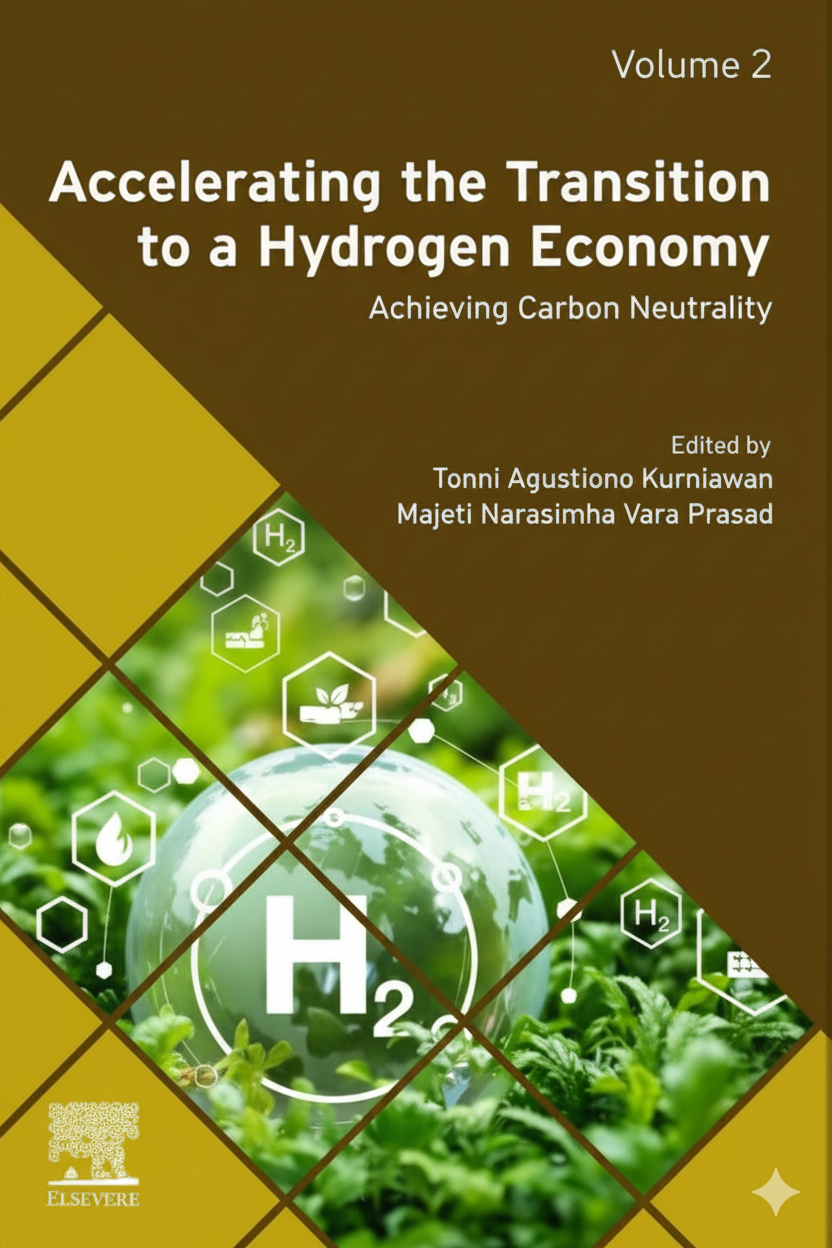Wolters Kluwer
Accelerating the Transition to a Hydrogen Economy. Achieving Carbon Neutrality Volume 2
Accelerating the Transition to a Hydrogen Economy. Achieving Carbon Neutrality Volume 2
Couldn't load pickup availability
FREE SHIPPING
Editors: Tonni Agustiono Kurniawan, Majeti Narasimha Vara Prasad
ISBN13: 9780443223990
Published: June 2025
Format: Paperback
Pages: 242
Publisher: Elsevier
Description:
Accelerating the Transition to a Hydrogen Economy provides a roadmap in the global economy, from carbon to hydrogen. Within the context of the Industrial Revolution 4.0, the book brings together global expertise from academia and industry to accelerate the science, innovation, and practice of the hydrogen economy to address energy challenges and advance UN Sustainable Development Goals. The book highlights the change of paradigm in the global economy from carbon to hydrogen, disseminating knowledge to readers about climate change and providing a critical overview of hydrogen generation and its utilization in various sectors.
Each chapter provides a synopsis of the fundamental knowledge and recent developments to ensure readers of all experience levels and backgrounds benefit. Future perspectives and actionable next steps are presented alongside case studies from different region of the world that provide a roadmap to decarbonization and the energy transition.
Key features
Offers a comprehensive overview with critical analysis of basic knowledge to the principles of hydrogen economy and its contribution in terms of net zero emission
Provides new understanding about the opportunities to net zero emission by implementing the utilization of such substance and its potential contribution in term of profit (economy) and environment (net-zero emissions)
Presents fundamental and applied knowledge regarding the basics of climate abatement technologies via hydrogen-based energy infrastructure conceptualization, design, implementation, and refinements, including multidisciplinary strategies and applications
Table of contents
Section I: A Journey of transition towards net zero emission
1. Pulling hydrogen from wastewater using sunlight
Kuldeep Kumar, Naveen Thakur, Nikesh Thakur and Pankaj Kumar
2. Innovative technologies of hydrogen generation from unused resources
Sumudu Mapa and Rangika S. Hikkaduwa Koralege
3. Biohydrogen Production From Microalgal Sources
Arvind Kumar Singh, Pankaj Kumar Rai, Prabhakar Singh and Sakshi Singh
4. Thermochemical routes for biohydrogen generation
Kaveh Edalati and W. P. R. T. Perera
Section II: Decarbonization through hydrogen economy
5. Resource recovery and energy generation from the waste material: Strategies for achieving carbon neutrality
Iva Yenis Septiariva
6. Hydrogen in low-carbon economies and its bottlenecks.
Luis Peres Azevedo Sr. and Carlos Alberto Ferreira Lagarinhos Sr.
Section III: Zero-carbon technology in Hydrogen economy
7. Role of hydrogen in achieving Nationally Determined Contributions, net-zero carbon emissions, and other emission targets
Kuldeep Kumar, Saurabh Sharma and Vishal Rana
8. Use of Hydrogen in Cement, Iron and Steel Industries for decarbonization
Majeti Narasimha Vara Prasad
9. Securing Africa’s Future Energies Scenario through Hydrogen Economy
Emeka E. Oguzie and Okezie Ihugba
About the editors
Tonni Agustiono Kurniawan
Dr. Tonni Agustiono Kurniawan’s degrees include a B.Sc. in chemistry from the Bogor Agricultural University (Indonesia), a M.Sc. in environmental technology from the Thammasat University (Thailand), and a Ph.D. in applied chemical technology from the Hong Kong Polytechnic University (China). He is the author of over 130 peer-reviewed publications in ISI-rated journals, 26 conference proceedings, including 9 book chapters and 6 monographs on waste to energy and wastewater treatment. He received the 2010 Green Talent Award from German Federal Ministry of Education and Research (BMBF), the 2013 Young Scientist Award from the World Economy Forum (WEF) (Switzerland), and the 2014 Scope-Zhongyu (France) for his outstanding research contribution to the fields of study. Elsevier and Stanford University (US) listed him among the top 2% of highly cited scientists in the field of Environmental Sciences.
Affiliations and expertise
College of Environment and Ecology, Xiamen University, Xiamen, China
Majeti Narasimha Vara Prasad
Dr. Prasad is Emeritus Professor, School of Life Sciences, University of Hyderabad (India). He has made outstanding contributions to the fields of bioremediation, bioresources, biomass energy sources, bioeconomy, and to the broad field of environmental biotechnology, all of which are his main areas of expertise. Dr. Prasad has served the Government of India’s Ministry of Environment, Forests and Climate Change as a member of various advisory committees on biodiversity conservation, ecosystem services, pollution control and abatement, environmental information systems and bioremediation of contaminated sites. He is an active visiting scientist for several international universities.
Affiliations and expertise
Emeritus Professor and Former Dean, School of Life Sciences, University of Hyderabad, Hyderabad, Telangana, India
Why Buy This Book?
- This is a critical resource for anyone involved in the global energy shift, offering a comprehensive, multidisciplinary roadmap from a carbon-based economy to a hydrogen-based one.
- Actionable Roadmap: The book moves beyond theory, providing case studies and actionable next steps for decarbonization and achieving net-zero emissions.
- Comprehensive Coverage: It offers a complete overview, from the fundamental principles of the hydrogen economy and innovative hydrogen generation techniques (like using wastewater and microalgae) to its practical utilization in high-emitting sectors (like cement, iron, and steel).
- Expert Insight: Featuring global expertise from both academia and industry, it connects science and innovation with real-world practice to address global energy challenges and advance UN Sustainable Development Goals.
- Economic & Environmental Focus: Gain a new understanding of the economic opportunities and the environmental benefits (net-zero emissions) that the widespread implementation of hydrogen technology can provide.
Keywords:
Hydrogen economy, carbon neutrality, energy transition, net-zero emissions, decarbonization, hydrogen generation, sustainable development goals, climate change solutions, zero-carbon technology, biohydrogen
Target Audience:
Environmental Engineers, Chemical Engineers, Energy Researchers, Policy Makers, Climate Scientists, Industry Professionals, Graduate Students, Sustainable Finance Analysts, Academics, Government Regulators
Genre:
Environmental Science, Chemical Technology, Renewable Energy, Engineering, Sustainable Development
📘 Learn more about shipping, delivery times, and returns, see our FAQ here


